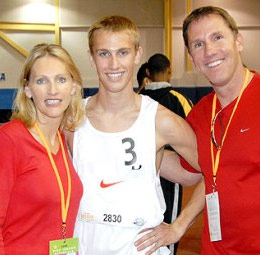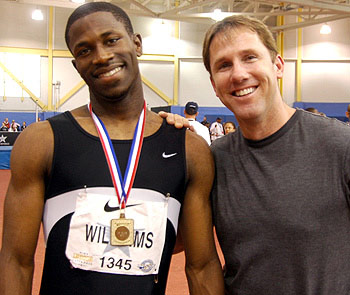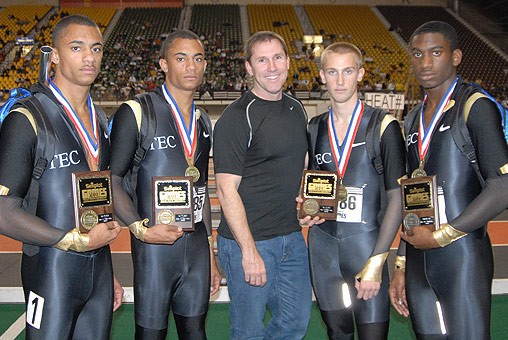 |
 |
 |
|
|
 |
 |
 |



What he’s Done:
Penned The Notebook, among other best-sellers
Ran 1:52 for the 800 meters and 4:11 for the mile in high school.
Earned a track scholarship to Notre Dame where he ran on their school record 4 x 800 meter relay team
Mentors young runners in New Bern, North Carolina.
|

| Nicholas Sparks with wife, Cathy, and son Miles
at Nike Indoor Nationals - Photo Donna Dye
|
Like many other people, I tried the other sports and they just weren’t right. I tended a little more towards individualism. I had dreams of making my freshman basketball team way back when, and that didn’t work out. I had had a moderate level of success running in junior high school, nothing major, only a few races. On our team at that time was a guy named Herald Kuphaldt, and he was a great runner and ended up winning the state meet in 1983 or ‘82 in the two mile (Editor’s note: Kuphaldt’s winning time in 1982 was 8:51.99). We were running when he was a freshman, and he said, “If you try here, you could be really good.” And that is really what set me off to try and be as good as I could in track and field.
My freshman year I ran 2:06.9 in the 800 and my sophomore year I improved to 1:55, which was a pretty drastic improvement. What I did was, over the summer I just ran hard intervals every day of the summer and then I also sometimes ran a second workout, a six or seven mile run. Then I ran cross country. I ran with Herald between November and March and then I ran track. By my sophomore year I was pretty decent in cross country. I think I ran, for 5K, 15:50, which is pretty solid for a sophomore. I improved to 1:55 and then I listened to everybody else, “Ah, you don’t need to train intervals all the time. Just run distance.” Then I ran distance and only dropped two seconds over the next couple of years.
I do not run anymore. I hung up the shoes a couple of years ago. I tore a calf muscle, not all the way through, but I tore it and I didn’t want to have surgery and so I do non-impact stuff and I lift weights, that kind of stuff.
|

| Sparks with his first star at New Bern, NC, Karjuan Williams, who
was displaced from his Lousiana home by Hurricane Katrina
Photo Donna Dye
|
On 'leaving' running: It was much bigger in college, when I decided to retire because I went off to college and I got injured my freshman year and struggled with injuries for the next three years. Heading into my senior year, I just knew that my body couldn’t do it, knew that my body couldn’t make it. I retired, essentially, and that was a very hard decision. It was made easier by the pain. I had Achilles’ surgery. I had surgery on my plantar fascia. I was getting cortisone shots every other week. I just couldn’t do it anymore. When every steps hurts and you limp all day and your Achilles is swollen and your plantar fascia is swollen, it does take the fun out of it.
On hard work and perseverance: I had talent, but I wasn’t the most gifted athlete in the history of world by any stretch of the imagination. It was just through sheer work and discipline and perseverance I was able to get a full scholarship. I actually had some success at it because I outworked people. That’s a great lesson to work on a daily basis—if you outwork people, you can do amazing things.
It is the exact same thing in writing. You sit down and you’ve got six months to write a novel and you want to do it the best you can. It’s very challenging and you’re dealing with tough stuff every day. You learn discipline and perseverance and the value of hard work and you just learn if you keep putting in the time and keep putting in 100% effort, and at the end you have a good shot of something good coming out of it. It may not be your dream. But it might be your dream. That’s what you learn from running, this ability to keep outworking people. You do that in a solitary effort. There’s no team cheering you on, there are no stands, nobody cares. That’s pretty much what writing is too. They cheer at the end, after it’s done, but that’s not the hard part. The hard part is putting in the work.
|

| Sparks with his stellar 2009 New Bern/Track EC line-up at the Simplot Games in Idaho.
Photo Donna Dye
|
On one of his mentors, Billy Mills, the 1964 Olympic gold medalist in the 10k: I’ve known of him ever since I was little because he lived in our town. I kind of idolized him. He’s very much like a second father to me because my parents died a long time ago, so I still see him three or four times a year. I stay at his house when I go to California. I still talk to Bill every day.
You race your own abilities and success can come in many forms.
On the advice he's given his son, Miles: I taught him that even though you have benefits in life, that on the track everybody is equal.
Parting words, on mentoring: Track and field changed my life. It offered me a chance to go to college, to chase my own dreams, to be a success, and I wanted to give that opportunity to other kids.
|
|
|
|
|
|
 |
 |